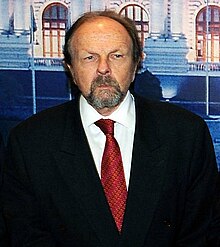Salomón Lerner Ghitis
| Salomón Lerner Ghitis | |
|---|---|
 |
|
| Prime Minister of Peru | |
|
In office 28 July 2011 – 10 December 2011 |
|
| President | Ollanta Humala |
| Preceded by | Rosario Fernández |
| Succeeded by | Oscar Valdés |
| Personal details | |
| Born |
4 February 1946 Lima, Peru |
| Political party | Independent |
| Profession | Industrial engineer, administrator |
| Religion | Judaism |
Salomón Lerner Ghitis, also known as Siomi Lerner (born 4 February 1946) is a Peruvian businessman and politician, who was Prime Minister of Peru from 28 July to 10 December 2011 and leader of the political movement Citizens for Change (CxC). He was appointed prime minister following the 2011 presidential election won by Ollanta Humala. Lerner resigned on 10 December 2011.
Salomón Lerner is of Jewish descent. He was born on 4 February 1946. He studied in Anglo-Peruvian School. From 1962 to 1967, he studied industrial engineering with focus on agribusiness at the National University of Engineering (UNI) in Lima. Later he attended post-gradual courses at the Monterrey Institute of Technology in Mexico, in 1968, and at the Technion Institute in Haifa, Israel, in 1989. As a student, he joined politics and became the chairman of the students' wing of the social-democratic APRA party.
Under the left-wing military administration of Juan Velasco Alvarado (1968–75), he was general manager of the Public Fish-Meal and Oil Marketing Enterprise (EPCHAP). In the government of Velasco's successor, Francisco Morales Bermúdez, Lerner was vice minister of foreign trade. In 1997, he managed CPN Radio channel, and from October 1997 to March 1998, he was a member of the board of Frecuencia Latina. At the end of the 1990s, he served as the CEO of the Banco del Progreso. When the NBK bank acquired Banco del Progreso in 2000, he stayed CEO of the merged bank, until his resignation during the crisis in July of that year.
Other functions performed by Salomón Lerner include manager of Helicópteros del Sur, Tecal S.A., and the Cotton Corporation of Peru, president of the Institute for Economic and Social Development (Indes), and the industrial engineers' chapter in the Association of Peruvian Engineers (CIP).
...
Wikipedia
